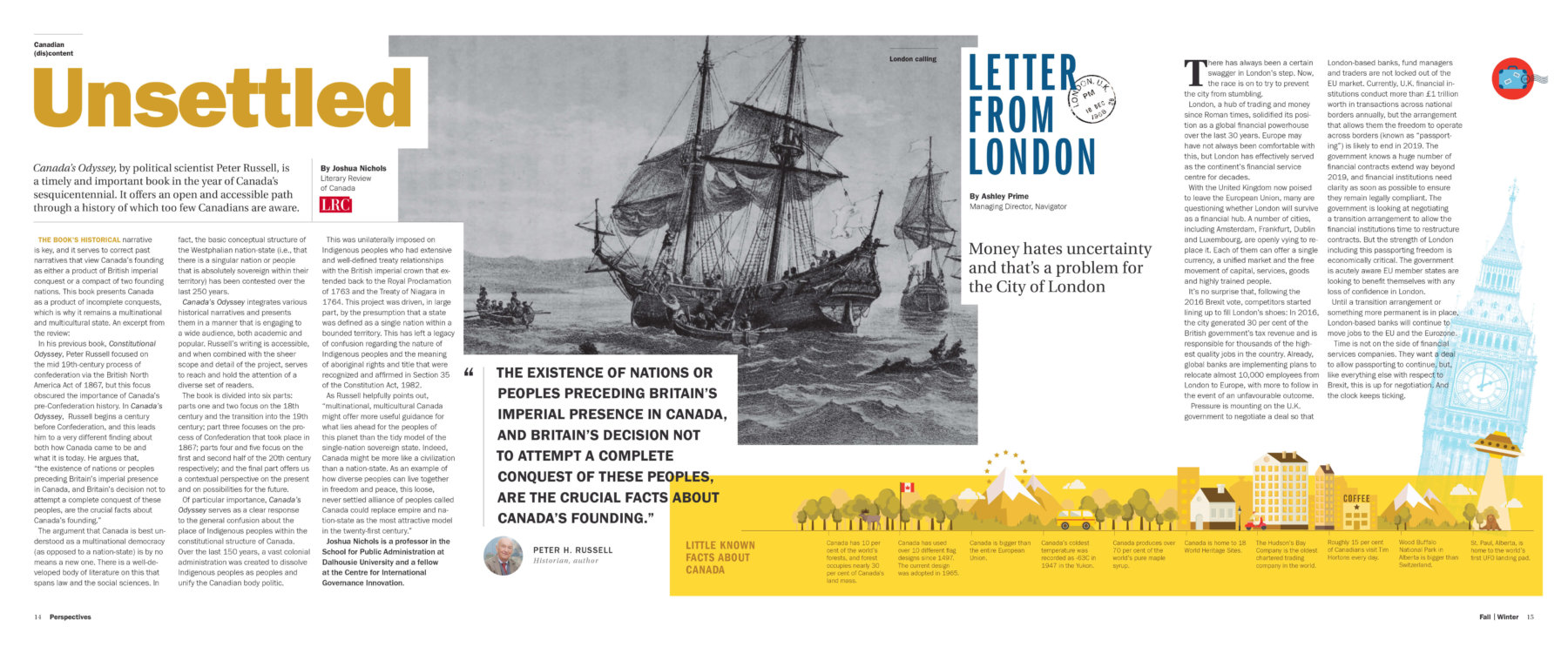- CEOCap
- Jaime Watt’s Debut Bestseller ‘What I Wish I Said’
- Media Training
- The Push Back
- Internship program
- Update Your Profile
- Homepage
- It’s time for a change
- It’s time for a change
- Kio
- Ottawa
- Art at Navigator
- Navigator Limited Ontario Accessibility Policy
- Virtual Retreat 2020 Closing Remarks
- COVID-19 Resources
- Offices
- Navigator Sight: COVID-19 Monitor
- Navigator Sight: COVID-19 Monitor – Archive
- Privacy Policy
- Research Privacy Policy
- Canadian Centre for the Purpose of the Corporation
- Chairman’s desk
- ELXN44
- Media
- Perspectives
- Podcasts
- Subscribe
- Crisis
- Reputation
- Government relations
- Public affairs campaigns
- Capital markets
- Discover
- studio
- How we win
- What we believe
- Who we are
- Careers
- Newsroom
- AI
- Empower by Navigator
- Environmental responsibility

Canada’s Odyssey, by political scientist Peter Russell, is a timely and important book in the year of Canada’s sesquicentennial. It offers an open and accessible path through a history of which too few Canadians are aware.
THE BOOK’S HISTORICAL narrative is key, and it serves to correct past narratives that view Canada’s founding as either a product of British imperial conquest or a compact of two founding nations. This book presents Canada as a product of incomplete conquests, which is why it remains a multinational and multicultural state. An excerpt from the review:
In his previous book, Constitutional Odyssey, Peter Russell focused on the mid 19th-century process of confederation via the British North America Act of 1867, but this focus obscured the importance of Canada’s pre-Confederation history. In Canada’s Odyssey, Russell begins a century before Confederation, and this leads him to a very different finding about both how Canada came to be and what it is today. He argues that, “the existence of nations or peoples preceding Britain’s imperial presence in Canada, and Britain’s decision not to attempt a complete conquest of these peoples, are the crucial facts about Canada’s founding.”
The argument that Canada is best understood as a multinational democracy (as opposed to a nation-state) is by no means a new one. There is a well-developed body of literature on this that spans law and the social sciences. In fact, the basic conceptual structure of the Westphalian nation-state (i.e., that there is a singular nation or people that is absolutely sovereign within their territory) has been contested over the last 250 years.
Canada’s Odyssey integrates various historical narratives and presents them in a manner that is engaging to a wide audience, both academic and popular. Russell’s writing is accessible, and when combined with the sheer scope and detail of the project, serves to reach and hold the attention of a diverse set of readers.
The book is divided into six parts: parts one and two focus on the 18th century and the transition into the 19th century; part three focuses on the process of Confederation that took place in 1867; parts four and five focus on the first and second half of the 20th century respectively; and the final part offers us a contextual perspective on the present and on possibilities for the future.
THE EXISTENCE OF NATIONS OR PEOPLES PRECEDING BRITAIN’S IMPERIAL PRESENCE IN CANADA, AND BRITAIN’S DECISION NOT TO ATTEMPT A COMPLETE CONQUEST OF THESE PEOPLES, ARE THE CRUCIAL FACTS ABOUT CANADA’S FOUNDING.
Of particular importance, Canada’s Odyssey serves as a clear response to the general confusion about the place of Indigenous peoples within the constitutional structure of Canada. Over the last 150 years, a vast colonial administration was created to dissolve Indigenous peoples as peoples and unify the Canadian body politic.
This was unilaterally imposed on Indigenous peoples who had extensive and well-defined treaty relationships with the British imperial crown that extended back to the Royal Proclamation of 1763 and the Treaty of Niagara in 1764. This project was driven, in large part, by the presumption that a state was defined as a single nation within a bounded territory. This has left a legacy of confusion regarding the nature of Indigenous peoples and the meaning of aboriginal rights and title that were recognized and affirmed in Section 35 of the Constitution Act, 1982.
As Russell helpfully points out, “multinational, multicultural Canada might offer more useful guidance for what lies ahead for the peoples of this planet than the tidy model of the single-nation sovereign state. Indeed, Canada might be more like a civilization than a nation-state. As an example of how diverse peoples can live together in freedom and peace, this loose, never settled alliance of peoples called Canada could replace empire and nation-state as the most attractive model in the twenty-first century.”
Joshua Nichols is a professor in the School for Public Administration at Dalhousie University and a fellow at the Centre for International Governance Innovation.
PETER H. RUSSELL | Historian, author
